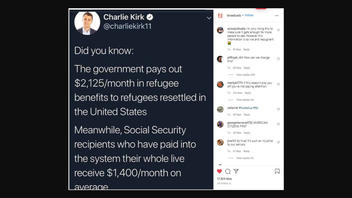
Does the government pay refugees more in monthly benefits than the average retired person drawing Social Security? No, that is not true. Refugees do receive some benefits during their first 90 days in the U.S.; however, those payments are temporary and are paid directly to nonprofit resettlement agencies, not to the refugees themselves. In contrast, the Social Security Administration pays eligible retirees a monthly benefit designed to replace a percentage of monthly wages, in perpetuity. Comparing the rate of benefits is misleading: one benefit is temporary and the other is not.
The claim appeared in a September 26, 2021, Instagram post (archived here) on the @charliekirk11 account under the title: "Did you know:" It opened:
The government pays out $2,125/month in refugee benefits to refugees resettled in the United States
Meanwhile, Social Security recipients who have paid into the system their whole live receive $1,400/month on average
Social media users saw this:
As defined by the U.S. office of Citizenship and Immigration Services and the U.S. Nationality Act, a refugee is a person "who has experienced past persecution or has a well-founded fear of persecution on account of race, religion, nationality, membership in a particular social group, or political opinion."
The Refugee Act of 1980 established the guidelines for allowing humanitarian entry into the U.S. for refugees and asylum seekers. The law also created the Reception and Placement (R&P) program which provides its network of resettlement agencies across the country with one-time, per-refugee payment to assist with expenses for up to 90 days.
In a November 5, 2021, email to Lead Stories, a State Department spokesperson said for refugees resettlement agencies currently receive $2,275, of which $1,225 can be used to fund direct assistance needs such as housing and basic necessities, including food, clothing, and furnishings. Direct payments to refugees are only provided in the rare event that they have established family or friend relationships who are able to meet their basic needs such as housing, the spokesperson said.
"The amount of $1,225 per person is the total amount available for direct assistance and is not a monthly payment, " the spokesperson said.
R&P benefits apply to refugees who enter the United States through the U.S. Refugee Admissions Program (USRAP), the spokesperson added. Funding for the program is paid for jointly by the Department of State and the Department of Health and Human Services, according to this fact sheet from the National Immigration Forum.
In contrast, benefits paid by the Social Security Administration (SSA) to eligible retirees are calculated based on a combination of factors, including a worker's record of earnings, the number of years they worked and when they choose to begin drawing benefits. Because of the individualized nature of the calculation, benefit amounts vary by person. Persons living with disabilities and the dependent children of deceased eligible workers are also eligible for benefits, although the payment calculation differs.
As of June 2021, the average benefit paid to 65 million retired U.S. workers by the Social Security Administration was $1,555. The figure was calculated using data from 2015, the most recent year for which data is available online.
Social Security is funded in the U.S. by way of payroll taxes. Workers and employers share the costs, each contributing 6.2% of wages up to the taxable minimum.












